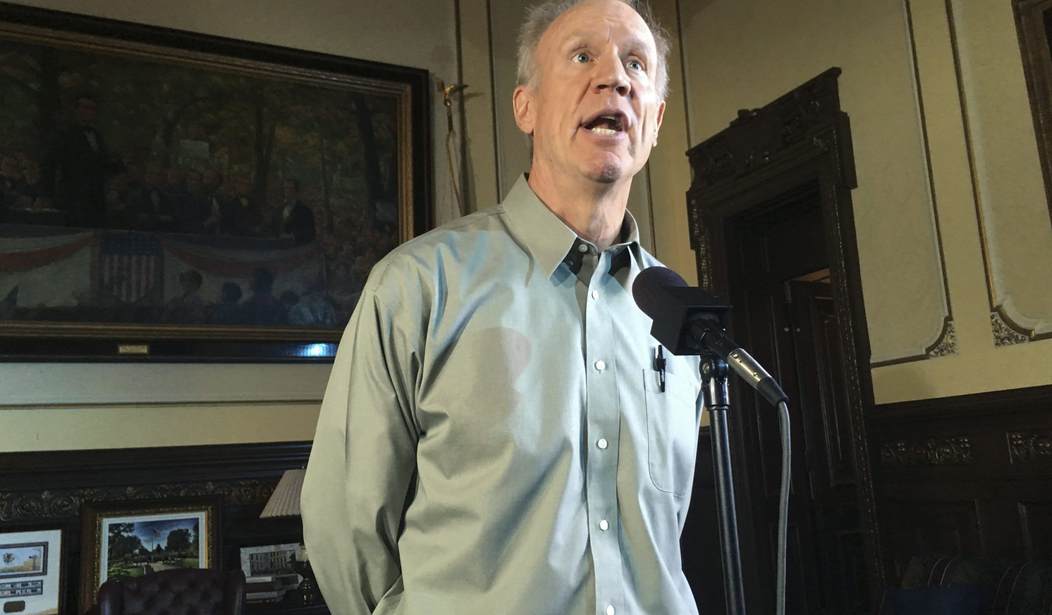Illinois’ gubernatorial candidates, incumbent GOP Governor Bruce Rauner and Democrat J.B. Pritzker, have sunk an astonishing $284 million combined into their race for governor. That’s already topped the $280 million spent in the 2010 California governor’s race, in which former Hewlett Packard CEO Meg Whitman largely self-funded a losing campaign against Democratic incumbent Jerry Brown.
Where has all that money been spent? Gobs of it have gone to pay for ads, ads, and more ads. Since February, the two have been slugging it out on the airwaves in a non-stop ad blitz that has taken the race so far below the belt that you can’t even see the buckle.
Lately, Rauner, who is trailing badly and expected to lose big, has gotten personal and nasty.
Gov. Bruce Rauner complained to fellow Republicans about his billionaire Democratic opponent, J.B. Pritzker, plowing $96 million more into his campaign war chest than he and his supporters have.
Rauner, himself a megamillionaire who has largely self-funded his two runs for office, spoke without a trace of irony.
“The guy has never worked an honest day in his life,” Rauner grumbled to supporters nursing beers at a suburban Chicago bar hosting an Illinois GOP rally this week. “He’s never had a job. He’s a member of the silver spoon club to put it nicely.
“He’s a trust fund baby. That’s all he is. The guy is a disaster.”
Um, speaking of “disaster,” there was a two-year fiscal crisis where the state operated without a budget. Rauner abandoned his conservative base and approved higher taxes, a school funding bill that bailed out Chicago public schools, an immigration sanctuary bill, and several other measures that so angered the right they put up a primary candidate who almost took him down.
The state now owes $16 billion in unpaid bills, mostly to smaller businesses. When Rauner arrived in Springfield promising reforms, the amount in unpaid bills was $6 billion. Rauner shouldn’t be using the word “disaster” in any context other than describing his own miserable performance.
But Rauner is right about Pritzker being a “trust fund baby.” Heir to the Hyatt hotel fortune, Pritzker is the perfect Democratic candidate for the state, as he would be a loyal minion to the real power in Illinois, Democratic Speaker of the House Michael Madigan.
Indeed, most of Rauner’s ads target Pritzker as a Madigan puppet. In fact, Rauner’s political demise can be traced directly to Madigan’s instransgience on the budget. And it started on day one of his administration:
From a Tribune editorial that day: “But his speech did not, could not, deliver salvation. Why? Because how much of Rauner’s vision gets executed depends on (House Speaker Michael) Madigan and (Senate President John) Cullerton. The duel is on. Will the Democratic leaders set their minds to undermining a Republican governor as much as they can, for as long as they can, in hopes that voters will replace him after four years of ugly battle?
“Will they demonize Rauner as the heartless bad guy and send him a budget that continues the Illinois pattern of avoidance? Or will they work with him on an honest budget that accomplishes enough of the governor’s agenda for him to sign it?”
We now know the answers. Democratic majorities in the House and Senate sent Rauner a wildly unbalanced budget the very first year, daring him to veto it. He did. Legislation that reflected the policy changes Rauner sought stayed bottled up in committees, or got otherwise manipulated by the Democrats, or were ignored altogether. Tensions flared. Heels dug. A war over the future of the state, punctuated with personal attacks from all sides, manifested itself in an inexcusable two-year budget standoff that damaged Illinois.
For these four years, though, Rauner has done what no one else has done during Madigan’s 48 years in Springfield: He has consistently opposed Madigan’s ambition to control Illinois politics and governance.
Madigan and the Democrats were perfectly willing to destroy the state to keep power. They kept accusing Rauner of being unwilling to “compromise” on the budget and were very successful in creating that perception.
The truth was that Democrats would only agree to vote for a budget that had none of the reforms asked for by Rauner. The governor caved, conservatives got angry, and here Rauner is, on the cusp of being unceremoniously tossed out of office.
Since both men have largely self-financed, talk of the damage done by “big money” politics has been largely muted. But more than a quarter of a billion dollars later, we may have to change our definition of “big money” altogether.










Join the conversation as a VIP Member